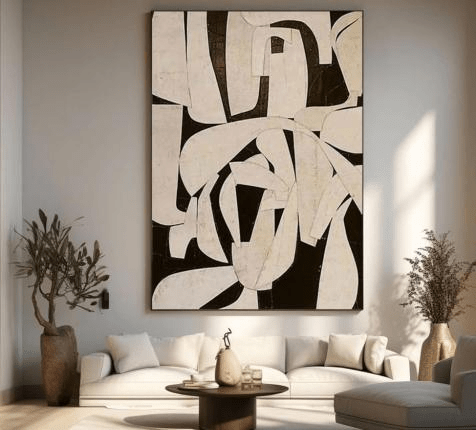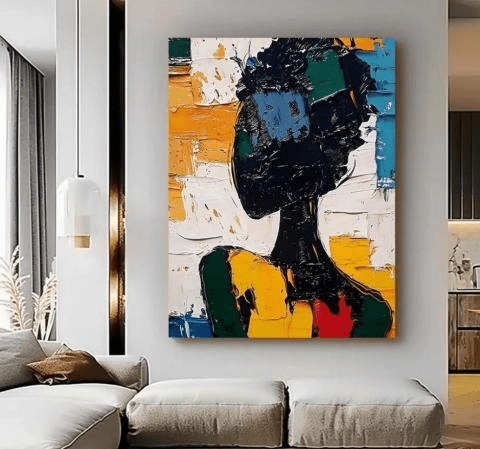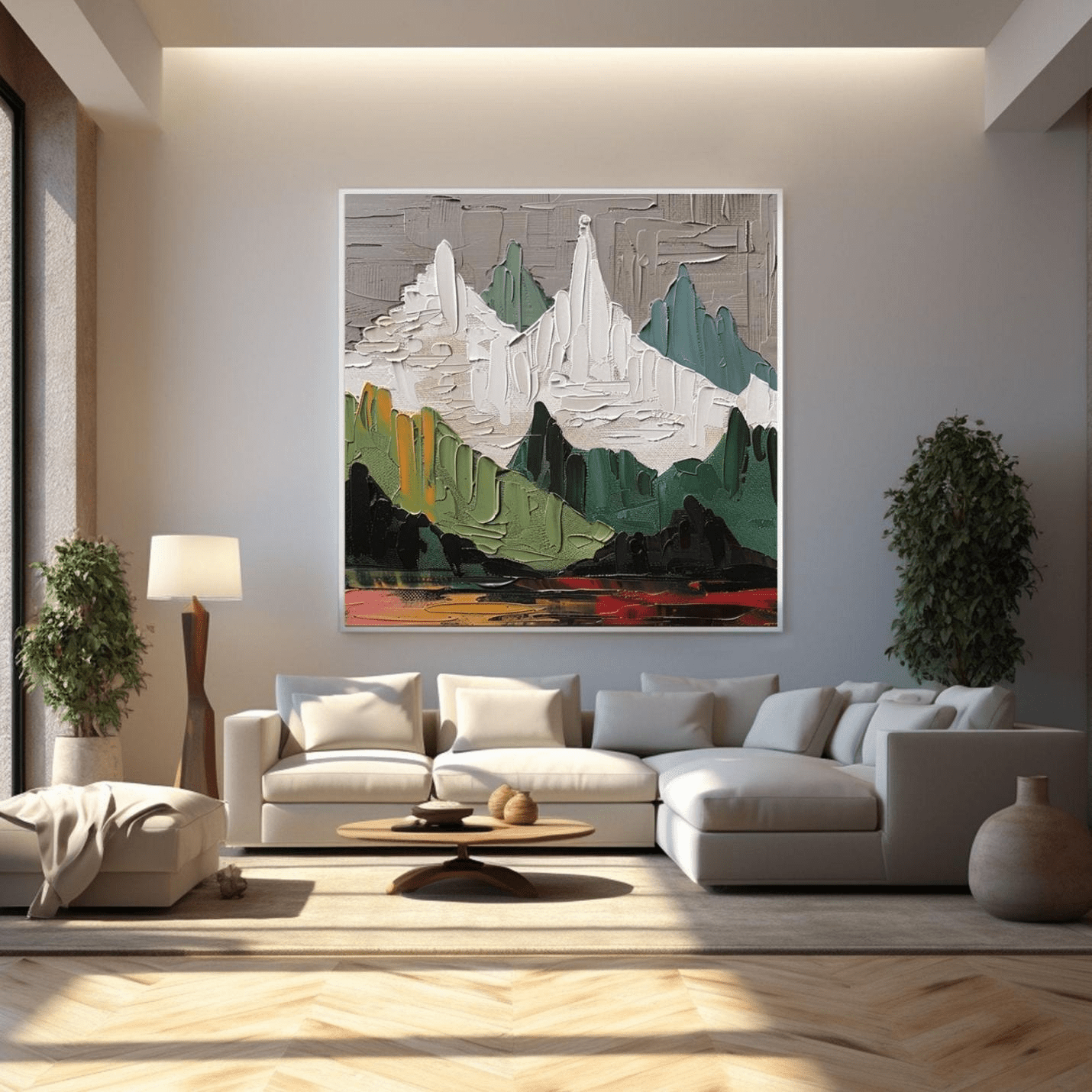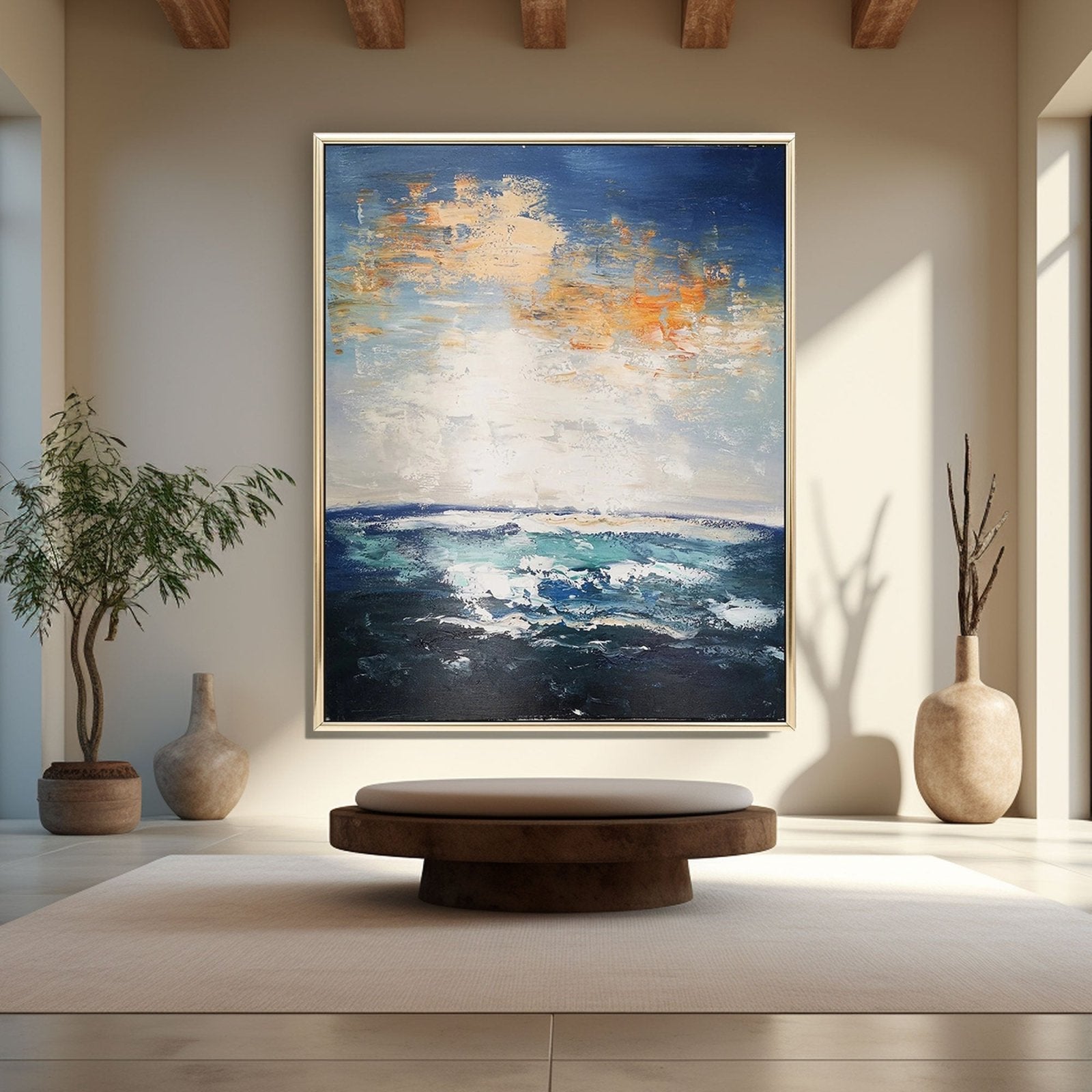
Le « look moderne » que vous aimez vient en fait de ces mouvements artistiques
Parcourez n'importe quel fil d'actualité déco moderne, que ce soit sur Pinterest, Instagram ou les blogs d'intérieur. Vous remarquerez systématiquement des lignes épurées, des textures douces, des espaces soignés et une palette de couleurs calme et minimaliste. Le « look moderne » est frais et intentionnel. Mais le hic, c'est qu'il n'est pas nouveau. Ce que nous appelons « moderne » aujourd'hui est en réalité le fruit de décennies (voire de siècles) d'évolution artistique.
Cette esthétique populaire n'est pas apparue du jour au lendemain ; elle a été façonnée par des artistes audacieux, des designers visionnaires et des évolutions culturelles qui ont bousculé les normes. Des mouvements comme l'expressionnisme abstrait, le minimalisme et le wabi-sabi n'ont pas seulement influencé le monde de l'art : ils ont progressivement envahi nos salons, nos chambres et même nos décorations murales.
Dans cet article, nous décortiquons l'ADN artistique du design moderne et vous montrons comment intégrer cette histoire à votre intérieur grâce aux pièces riches en sens et magnifiquement réalisées par NukeArt. Que vous soyez amateur d'art mural texturé 3D , que vous appréciez l'élégance discrète du plâtre minimaliste ou que vous exploriez l'art wabi sabi, ce guide vous aidera à comprendre les racines de vos styles modernes préférés.
Expressionnisme abstrait : la naissance du modernisme émotionnel
Si le design moderne avait une dimension émotionnelle, ce serait l'expressionnisme abstrait. Ce mouvement du milieu du XXe siècle, né aux États-Unis dans les années 1940 et 1950, a révolutionné le monde de l'art par son approche spontanée, expressive et souvent chaotique de la peinture. Pensez aux toiles éclaboussées de Jackson Pollock ou aux vastes champs de couleurs de Mark Rothko, qui semblent vibrer d'émotion.
Fondamentalement, l'expressionnisme abstrait rejetait l'idée que l'art devait représenter quelque chose de littéral. Il cherchait plutôt à susciter l'émotion (une émotion profonde, brute et humaine) par la forme, la couleur et le geste. Il ne s'agissait pas de créer une scène, mais de susciter un sentiment.
Aujourd'hui, on retrouve des échos de ce mouvement dans les intérieurs modernes. L'abstraction émotionnelle est devenue un choix esthétique incontournable, aussi bien dans les salons que dans les bureaux et les chambres. Cette explosion de couleurs sur un mur ? Ce coup de pinceau audacieux et ample sur une toile ? Voilà l'esprit de l'expressionnisme abstrait qui perdure.
Sélections en vedette de NukeArt :
● Peinture abstraite – Ondulations du temps

Cette œuvre éclatante incarne l'énergie dynamique de l'abstraction du milieu du siècle. Des couleurs vives et un mouvement fluide donnent vie et personnalité à une pièce. Ce tableau est un excellent choix pour insuffler de l'émotion dans un espace épuré et moderne. Il peut donner vie à n'importe quel espace moderne.
● Peinture abstraite – Radiant Bloom

Il s'agit d'une peinture abstraite à la palette douce mais à la texture riche. Cette œuvre allie profondeur et subtilité pour créer une floraison éclatante. Cette œuvre de NukeArt est parfaite pour les pièces modernes au style minimaliste mais qui ont néanmoins besoin de caractère.
Si vous cherchez à allier émotion et simplicité, l'art abstrait noir offre un clin d'œil moderne et saisissant à ce mouvement. Ces œuvres monochromes ancrent un espace tout en suscitant la curiosité.
Minimalisme : moins, c'est vraiment plus
Si l'expressionnisme abstrait était une explosion émotionnelle chaotique, le minimalisme est né du moment où quelqu'un est intervenu et a dit : « Simplifions. » Apparu dans les années 1960, le minimalisme s'est imposé comme une réponse à la complexité, non seulement dans l'art, mais aussi dans la vie. Il s'agissait d'éliminer le superflu et de se concentrer sur l'essence des choses.
L'art minimaliste privilégiait les tons neutres, les formes géométriques et les compositions apaisantes. Il invitait le spectateur à ralentir et à prêter attention. En pénétrant dans le monde de la décoration intérieure, le minimalisme a apporté une révolution esthétique : murs blancs, espace négatif et accent mis sur les matériaux et la lumière.
Aujourd'hui, cette influence est omniprésente. Elle se retrouve dans vos espaces d'inspiration scandinave préférés. Elle se retrouve dans l'élégance discrète des décorations murales blanches texturées . Elle se retrouve dans cette étagère aux lignes épurées que vous venez d'épingler.
Sélections en vedette de NukeArt :
● Peinture minimaliste en noir et blanc – Entangle

Entangle est une peinture au contraste saisissant et équilibré entre l'ombre et la lumière. Cette œuvre minimaliste de NukeArt offre un mouvement sculptural sans surcharger l'espace. Un choix audacieux pour les amateurs d' art minimaliste moderne . Accrochez-la simplement dans votre salon pour créer un point focal attrayant.
● Art mural minimaliste blanc

Sobre, élégante et naturellement moderne, cette catégorie incarne parfaitement l'esprit minimaliste : calme, épuré et plein d'intention. Que vous décoriez un couloir ou une chambre paisible, ces pièces créent une atmosphère sereine et simple. Cette décoration murale minimaliste blanche offre une sophistication discrète, si recherchée dans les intérieurs minimalistes.
En fait, l'art minimaliste du plâtre est l'une des interprétations les plus puissantes de ce mouvement ancien. Avec ses textures douces et ses formes architecturales, il ajoute chaleur et profondeur à la palette minimaliste sans encombrer la pièce.
Wabi-Sabi : trouver la beauté dans l'imperfection
Alors que les mouvements artistiques occidentaux comme le minimalisme et l’expressionnisme abstrait se concentraient sur la clarté émotionnelle ou la retenue structurelle, la philosophie japonaise du Wabi-Sabi offre quelque chose de magnifiquement différent : une appréciation de l’imperfection, de l’impermanence et de l’organique.
Ancré dans l'esthétique zen traditionnelle, le Wabi-Sabi célèbre la nature. Il puise sa beauté dans le bois patiné, la poterie craquelée, les textures brutes et les tons terreux. Il nous invite à ralentir, à accepter nos défauts et à voir la beauté du quotidien.
L'art wabi-sabi gagne en influence dans la décoration intérieure moderne, notamment à l'heure où de plus en plus de personnes recherchent des environnements calmes et apaisants. On le retrouve dans l'essor des matériaux naturels, des couleurs neutres et des objets artisanaux.
Sélections en vedette de NukeArt :
● Peinture en plâtre – Dune

Cette œuvre d'art en plâtre évoque le mouvement subtil du sable et de la terre. Avec ses tons naturels et sa finition brute, elle apporte une touche wabi-sabi aux espaces contemporains avec une force tranquille. Si vous êtes plutôt amoureux de la nature, vous adorerez ce tableau.
● Peinture Wabi-Sabi – Marron Beige

Chaleureuse, complexe et profondément apaisante, cette œuvre illustre parfaitement l'art wabi sabi dans le monde moderne. Elle est idéale pour les espaces qui privilégient le modernisme organique ou le style Japandi. Elle illustre parfaitement la manière dont l'art wabi sabi peut interagir avec les intérieurs modernes.
Ce mouvement s'harmonise également parfaitement avec l'art mural texturé blanc et la peinture texturée 3D , des styles qui honorent l'imperfection à travers la profondeur et la matérialité.
Art textural contemporain : sublimer le design moderne
À mesure que le design moderne évolue, une tendance s'impose discrètement : la texture. Qu'elle prenne la forme de céramiques tactiles, de meubles bouclés ou d'œuvres d'art murales aux multiples couches, la texture apporte chaleur et profondeur aux espaces qui pourraient autrement paraître trop épurés ou plats.
Dans le monde de l'art, cela a donné naissance à un genre alliant sobriété minimaliste et éléments sculpturaux : l'art mural texturé 3D. Ces œuvres ne sont pas seulement magnifiques, elles sont aussi des expériences sensorielles. Elles captent la lumière, créent des jeux d'ombres et changent selon l'endroit où l'on se trouve.
Voici quelques sélections de NukeArt :
●Peinture texturée 3D – Surge

Cette peinture texturée en 3D représente une vague de mouvement figée dans le temps. Influencée à la fois par l'expressionnisme abstrait et le minimalisme, elle crée un pont entre émotion et sobriété.
● Peinture texturée 3D – Mirage du désert

Avec ses lignes douces et fluides et ses tons terreux, ce tableau s'intègre parfaitement aux intérieurs modernes et neutres. C'est une œuvre discrète, mais inoubliable. Exactement le genre d'œuvre qui incarne le « look moderne ».
L'attrait de la peinture texturée 3D réside dans sa polyvalence. Que vous soyez plutôt minimaliste, organique ou contemporain, l'art texturé apporte cette touche supplémentaire qui transforme une pièce simple en un espace soigné.
Pourquoi le « look moderne » est plus qu’une tendance
En vérité, le « look moderne » n'est pas une tendance passagère, et il n'est pas né avec les réseaux sociaux. Il est le fruit de décennies de réflexion et d'expérimentation artistiques. De l'émotion brute de l'expressionnisme abstrait aux principes épurés du minimalisme, en passant par l'imperfection profonde du wabi-sabi, tous ces mouvements nourrissent ce que nous appelons aujourd'hui le goût contemporain.
Comprendre cette histoire nous aide à aller au-delà de la décoration. Choisir une œuvre d'art ou un meuble, ce n'est pas seulement choisir un style, c'est choisir des valeurs. Envie d'un espace chargé d'émotion et vivant ? L'expressionnisme abstrait est fait pour vous. Envie de paix et de clarté ? Le minimalisme est là pour vous. Besoin de chaleur et d'ancrage ? Adoptez le Wabi-Sabi.
Même les œuvres murales texturées en 3D ou les œuvres abstraites noires les plus modernes doivent leur esthétique à ces riches traditions. Et lorsque vous décorez avec intention, chaque pièce prend tout son sens. Ce n'est pas seulement une jolie œuvre sur un mur, c'est une œuvre qui s'inscrit dans une lignée.
Conclusion : Faites entrer le passé dans votre présent
Ainsi, la prochaine fois que quelqu'un complimentera votre maison moderne, vous connaîtrez la vérité : vous vivez dans un espace façonné par l'histoire de l'art.
Ce qui paraît « moderne » aujourd'hui était autrefois radical. Il s'agissait autrefois d'un coup de pinceau sur une toile vierge, d'une plaque de plâtre brut ou d'un bol en céramique discret traversé par une fissure. Ces mouvements ont redéfini la beauté et continuent de guider notre façon de concevoir et de décorer.
En choisissant des œuvres qui rendent hommage à ces styles, vous ne vous contentez pas de suivre la tendance, vous vous imprégnez d'une histoire visuelle qui traverse les générations. Que vous soyez attiré par la profondeur émotionnelle de l'art abstrait noir, la sobriété paisible de l'art minimaliste moderne ou le calme tactile de l'art wabi sabi, il y a une raison plus profonde à l'écho de ces œuvres.
Prêt à créer votre propre histoire ?
Apportez un modernisme significatif dans votre espace avec la collection de NukeArt.
Découvrez la sélection complète ici »




